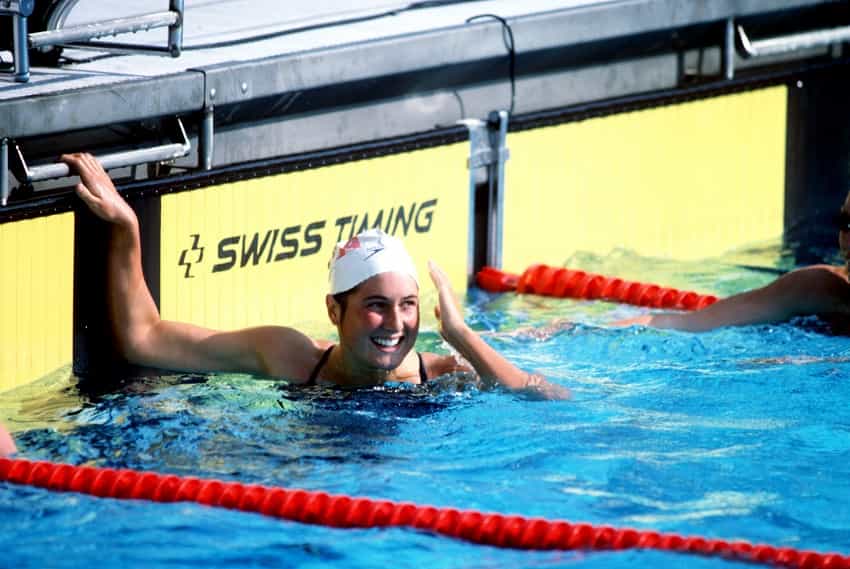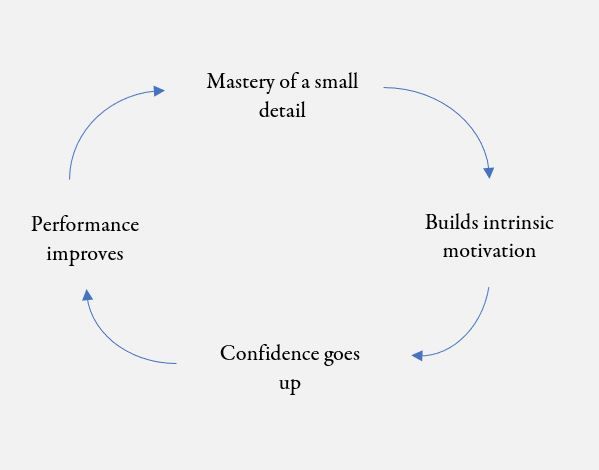At the age of 13, Mary T. Meagher decided that she was going to break a world record.
While most of her teammates were daydreaming about JO’s or wanting to qualify for nationals, Meagher had made the decision to take a run at the world record in the 200m butterfly.
But she knew that she would have to ramp things up in training in order to make this dream happen.
Meagher decided on two specific things:
- She would show up to every practice on time
- She would perform every turn to the best of her abilities.
A year later, Meagher would break the first of her world records.
In 1981, a couple years after throwing herself into excellence with just those two little decisions, Mary T. Meagher broke the world record in the 200-meter butterfly for the fifth time, swimming a 2:05.91.
In total, Meagher shaved over four seconds off the world record in the 200.
It would take nearly 20 years for someone to beat her 2:05.
Success is ordinary
The way you swim in the water is influenced by dozens of things outside of genetics and talent.
The final product of your swimming, the nail you hammer on race day, is the product of countless skills and habits developed slowly, intermittently and fitfully over your career.
It’s almost impossible to count the number of ways that you improve over the years. You improve the entry on your dive, shaving half a second. You spend a couple months really working to improve your dolphin kick, giving you another burst of improvement. You clean up your diet, giving you more energy and better practices, which give you another level-up.
This is how excellence happens.
By mastering the details. By nailing the seemingly trivial things.
But instead, most of us focus on working harder (which is kind of a meaningless sentiment when not directed at specific aspects of our swimming).
Or we spend our time and energy wishing that we were more talented.
But for a quick second, just imagine how many more improvements are lurking around the corner if you tightened up your body position, turned a little faster, got more sleep each night, ate a little bit better, or made your streamline a little more streamline-y?
When viewed this way, excellence looks a little boring, doesn’t it?
It certainly lacks the stratospheric breakout story that we come to expect when describing successful swimmers.
When researcher Danny Chambliss asked Meagher what the biggest misconception was about elite swimmers, Meagher replied, “People don’t know how ordinary success is.”
How Mary T. started with a couple details
Mary T.’s decisions to hammer a couple details look border-line meaningless on the outside. But when something is done really well consistently over time it produces excellence. And more powerfully, this excellence spills out into other areas of your swimming.
When Meagher became determined to make it to practice on time every single day, it gave “her the sense that every minute of practice time counted.” This meant getting to the pool, which often required her mom to perform feats of heavy-footed driving across Louisville, Kentucky from school to practice.
Each practice started to take on a heightened sense of importance.
By performing each turn in the pool as quickly and as technically perfectly as possible, Meagher created a standard for her swimming that would soon infect the rest of her training.
While most swimmers tend to float like manatees in and out of the walls, performing turns that are on the cusp of getting them disqualified in competition, Meagher charged in, touched perfectly, and charged out.
Faster turns also meant faster breakouts, and the confidence to know that her turns would a strong point for her, something she could rely on during days and races where she wasn’t feeling her best in the water.
The initial decision to execute awesome turns led to a cascading series of benefits. Faster turns made for faster breakouts, faster breakouts meant faster average speed per length, and so on.
Master a couple of “small things” and watch your motivation and confidence skyrocket
I talk a lot about the power of small wins and crushing your process. They are a great place to build a bullet-proof foundation of confidence and better swimming.
The competence and mastery you get from getting good at what most swimmers will consider trivial or insignificant forms the basis of the chasm that will separate you from them over time.
The cycle is powerful as it is simple.
You get good at one thing, your motivation and confidence surge, leading to better swimming. As you master one thing, your newfound confidence encourages you to master the more difficult things ahead.
The pattern repeats itself over time, steadily forging you into a crazy-fast swimmer:
On the surface (ha—swimming pun!), these details look boring and border-line meaningless. Taken individually and when done once or intermittently they don’t really impact performance.
Showing up on time to practice? Doing every turn like a chlorinated monster? Pfft—anyone can do that.
And yet how often do you? How often do your teammates? How often does the competition?
“There is nothing extraordinary or superhuman in any one of those actions; only the fact that they are done consistently and correctly, and all together, produce excellence,” said Chambliss.
More Stuff Like This:
This New Mental Training Book Will Help You Swim Like a Rock Star This Season. Ready to take your swimming to the next level? Learn more about our awesome mental training book that will help you rock out with your socks out, whether it’s in practice or competition.
10 Things That Have Nothing to Do with Talent. Much is made about having lots of talent. But talent alone doesn’t make champion swimmers. And it’s something you also don’t control. Here’s what to focus on instead.















